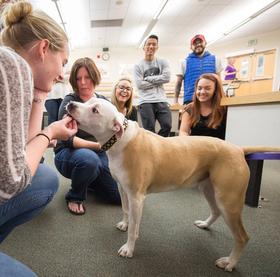While our economy is slowly digging its way out of the current financial crisis, many are wondering whether jobs will return to a nation facing one of its highest unemployment rates in history. Financial and employment experts are predicting that there will be a resurgence of employment in the not-so-distant future – but it may be in career fields we don't expect. The "middle skills" positions are predicted to become the wave of the future, and community colleges are ready across the country to prepare individuals of all ages for lucrative, stable careers in these industries.
What is a "Middle Skill" Job?
"Middle skill" is the new term coined for jobs that require more education than a high school diploma but less than a four-year degree. These jobs are found in healthcare, IT, and electronics and are touted as some of the up-and-coming careers over the next decade. Community colleges are perfectly poised to handle the training for such positions, with highly specialized programs that educate students while preparing them for a rewarding career after graduation.
A report at Connected California explains that the term "middle-skill" refers specifically to the level of training required for the job and should not be confused with the competence or experience of the employees who work in these positions. Many of the employees in these positions have had highly specialized training, and some even boast years of work experience that has helped them hone their skills in their industry. The most common places to prepare for a "middle skills" job is at a community college, private career school, an apprenticeship program or a non-profit training program.
This video discusses workforce training for middle-skill jobs.
The Prevalence of "Middle Skill" Jobs
While "middle skills" are demanded across the country, peering into one state can give a clear picture of projected demand. According to an article from The Republican, published on MassLive.com, the National Skills Coalition estimates that around 38 percent of the jobs in the state of Massachusetts will become "middle skills" jobs between 2006 and 2016. Some of the specific positions expected to show the biggest jump in this state include dental hygienists, physical therapy assistants, computer support specialists, auto and truck mechanics, paralegals, and medical sonographers. It is predicted that these industries will most need workers as the recession comes to a close, and they will head to local community colleges to find trained applicants ready to move directly into the workplace.
Luke Hardy, a student at Springfield Technical Community College in Massachusetts, enrolled in the school's heating, ventilation, and air conditioning program after getting laid off from his job in commercial and residential maintenance and construction. Hardy told The Republican, "I'm really enjoying myself, even though it's 30 years since I've been in the classroom. It was very easy to work myself back in."
Hardy is not the only one in the state pursuing "middle skills" training at community colleges in Massachusetts. All of the state's colleges have seen record enrollment since the economic meltdown began in 2008, according to The Republican. Over the past five years, enrollment in community colleges has risen a whopping 25 percent, bringing the number of students attending one of these institutions in the fall 2010 semester to over 100,000.
Deere and Co. Getting Trained Workers
In Indiana and other training programs across the country, Deere is partnering with community colleges to raise a new generation of technicians with the necessary "middle skills" to maintain and repair Deere equipment. According to Medill Reports Chicago, the company provides equipment to the qualifying institutions and professional internships for all of the students in the program. In return, Deere enjoys a highly trained group of applicants from every graduating class – which they quickly place in positions with their company at locations across the country.
This video covers a Brookings Institution briefing on The Future of Middle-Skill Jobs.
Arthur Haase, dean of technology at Vincennes University, told Medill that 100 percent of their 3,500 students who graduate from the program yearly go directly into jobs working in a Deere service department. Haase added, "Most people when they think of something like this, think of kids turning wrenches. Today it's about extremely technical component analysis. Somebody needs to be able to understand all of that and that's what John Deere is investing in through this program – highly trained individuals."
Middle Skills in Maryland's Labor Market
The Maryland Department of Labor, Licensing and Regulation projects "middle skill" jobs at around 42 percent between 2006 and 2016. Despite these promising figures, the state is seeing a shortage of skilled workers in many areas, leading to employment gaps that cannot be filled overnight. To help alleviate the problem, Maryland Governor Martin O'Malley has initiated a new program called Skills2Compete, designed to get more qualified workers into the workforce in a relatively short period. The deal is available to recent high school graduates, displaced workers who have been unable to find new positions since the financial downturn began, or those simply looking for a more lucrative career.
In this video NFIB CEO Juanita Duggan on the challenges for small businesses in finding skilled labor.
Carroll Community College is offering career-training courses in business management, animal welfare, construction trades, graphic design, information technology, law enforcement, and child care. According to the college website, programs that lead to certification include home inspection, EKG technician, and bookkeeping.
If "middle skills" are the wave of the future for this country, community colleges are equipped and ready to educate the future workforce of this country. Whether you are a new high school graduate weighing opportunities or a displaced worker that needs training for a new career, a "middle skill" program at your local community college might be the right choice for you.
Questions? Contact us on Facebook. @communitycollegereview















